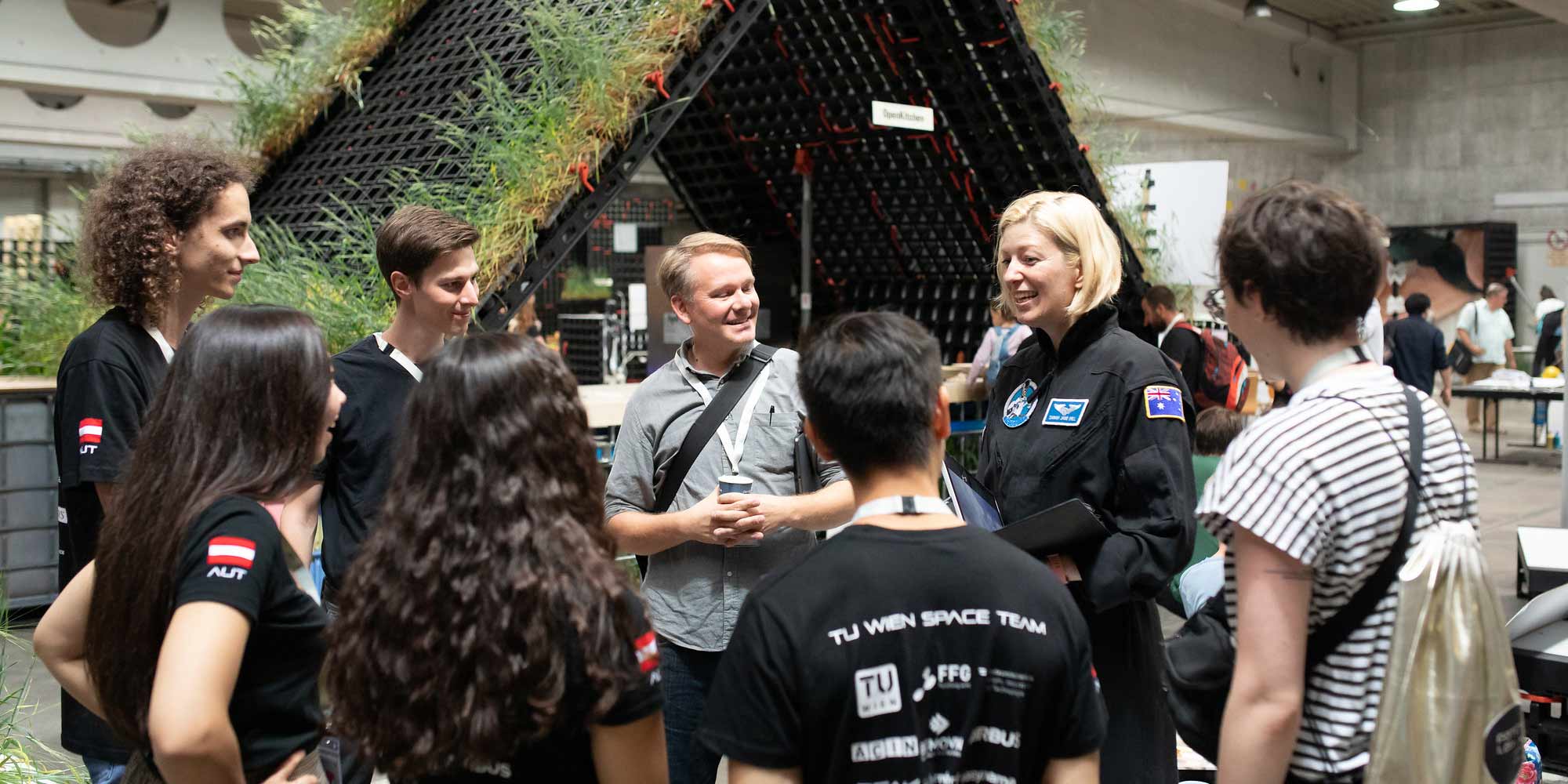About the spaceEU Activities
Together with engagement experts from Ciencia Viva and Science Gallery Dublin Ars Electronica developed the spaceEU activities. The goal was to adapt interdisciplinary and practise-based learning methodology for space education inside and outside the classroom with STEAM approaches targeted towards youth. The activities can be implemented and adapted by educators, community organisers, workshop facilitators and STEAM organisations. They can also be linked to the exhibition Step into Space. Again, the goal is that educators, individuals and organisations outside the spaceEU consortium can implement the activities. The toolkit Engage with Space provides step by step instructions about how to implement these activities. Find below general descriptions of the activities.

If you have any questions feel free to reach out to the spaceEU project manager at Ars Electronica Laura: laura.welzenbach@ars.electronica.art
spaceEU Activity: Space in the Classroom
Based on Ciencia Viva Ìs experience, talks in primary and secondary schools by space researchers or industry specialists, a methodology was developed that brings space practitioners to the classroom. Ars Electronica’s expertise with Art and Technology workshops in schools (known as the “create your world tour” ) brought a new layer to this. In order to bring STEAM and STARTS to the conversation, a collaboration with artists can be seen as one proposal of how to open up and adapt the existing format.
In partnership with spaceEU, the create your world festival comes directly into your classroom. Under the title create your world: space TOUR we can offer you two popular workshops for free. The contents are about future issues as well as competencies such as critical thinking and solution-oriented action. Space serves as a source of inspiration and communication.
create your world spaceTOUR x Hacking Humans for Space Exploration
create your world spaceTOUR x STEAM in Space (title tbc)
spaceEU Activity: space4youth
space4youth is a peer-to-peer event. Participants get the opportunity to design their own event, conference or workshop format and implement it with the help of the facilitator or organisation. The goal is to build confidence, self-efficacy, decision making skills and learn how to communicate their ideas and knowledge. As the core goal is to focus on underprivileged youth and girls, we employ strategies to create a space where youth feels encouraged. Hosting a co-design session as in the space4youth activity is central. It helps youth feel comfortable and prepared. Combining the open call with any other activity listed here can be one way of implementation and combination.
spaceEU Activity: space4youth open call
The open call is based on the success of Ars Electronica’s annual youth competition u19 — create your world contest. spaceEU developed general guidelines for an open call that can be used in combination with the space4youth activity but also other programmes like the exhibition. Again, in order to make this open call accessible to underserved communities the competitiveness character was put aside and focuses on an application and sharing aspect. Open calls can be used as tools to also access new audiences as well as democratizing programmes. Science centers, museums and other organisations can open up their programme and invite their neighborhood to become active in making and contributing with their own ideas. Depending on open call experiences the activity can be implemented with smaller groups (e.g. within a school or classroom) where everybody will then be part of the actual event. It can also be scaled up and applicants can become part of a bigger programme. Another example of where the open call principles and basics can also be used outside the youth engagement framework could be to select a teacher for the summer school.
spaceEU Activity: Citizens’ space debate
With the Citizens’ Space Debate we aim to gather policy makers, scientists and the general public in one room to discuss questions like “What should space exploration focus on next?”, “What is your take on exploitation of minerals on the Moon?”. This format provides the opportunity to get specialists connected to the general public by focusing on challenging questions that either address daily life or present non consensual topics for discussion. It builds a bridge between experts and the general public and provides a platform for conversation and exchange. It is important that the experts understand that their role in the event is not to present their field of study and expertise but rather to focus on dialogue and exchange with every attendant.
spaceEU Activity: Space Unconference
The Space Unconference aims to transform the “best” part of a conference to its central aspect, namely networking and chatting during coffee breaks. The informal gathering of researchers, specialists from the space sector, university students, school teachers and the general public removes the speaker-audience-setting and everyone will become a presenter and networker. Participants co-create the programme of the conference as it goes along, in the form of talks, debates and practical sessions.
spaceEU Activity: Space Cafe
Space Café is a variation of a Science Café, a short and informal talk in which one/two expert(s) briefly present a current research, innovation, policy or design topic (space related) followed by informal discussions with a small audience. The key here is to create an inviting space to facilitate a high degree of interaction between public and expert. Space Café helps establish new connections, contributing to build trust and openness to dialogue. To some degree, participants should be familiar with the topic to be discussed. Space Cafes can also be used to promote dialogue between different fields or between scientists, industry representatives and decision makers, namely Members of Government or Parliament.
 spaceEU project has received funding from the European Union’´s Horizon 2020 Framework Programme for Research and Innovation under grant agreement No. 821832
spaceEU project has received funding from the European Union’´s Horizon 2020 Framework Programme for Research and Innovation under grant agreement No. 821832